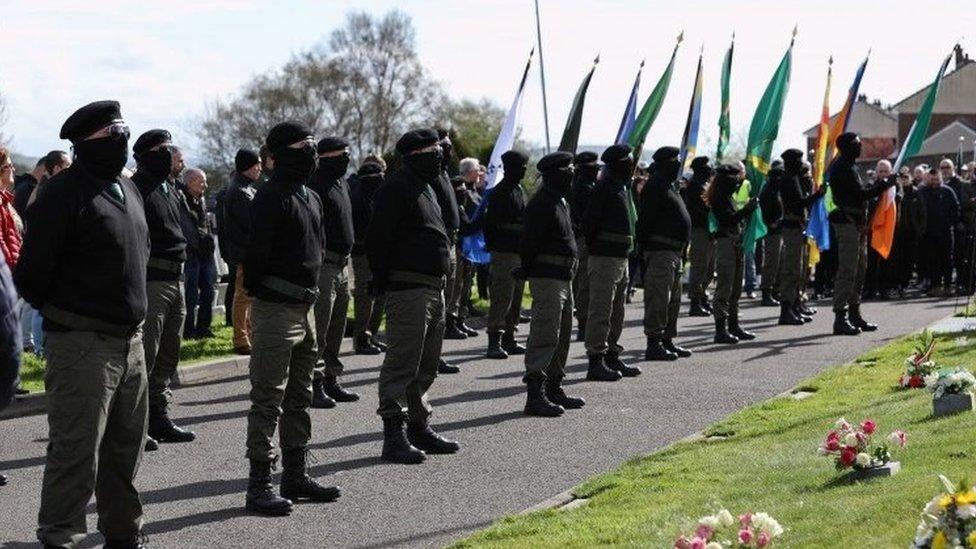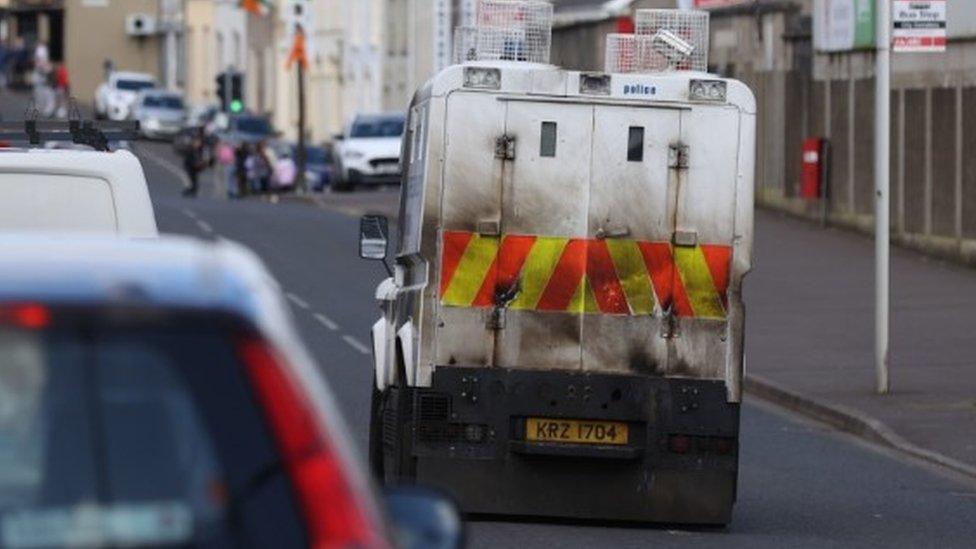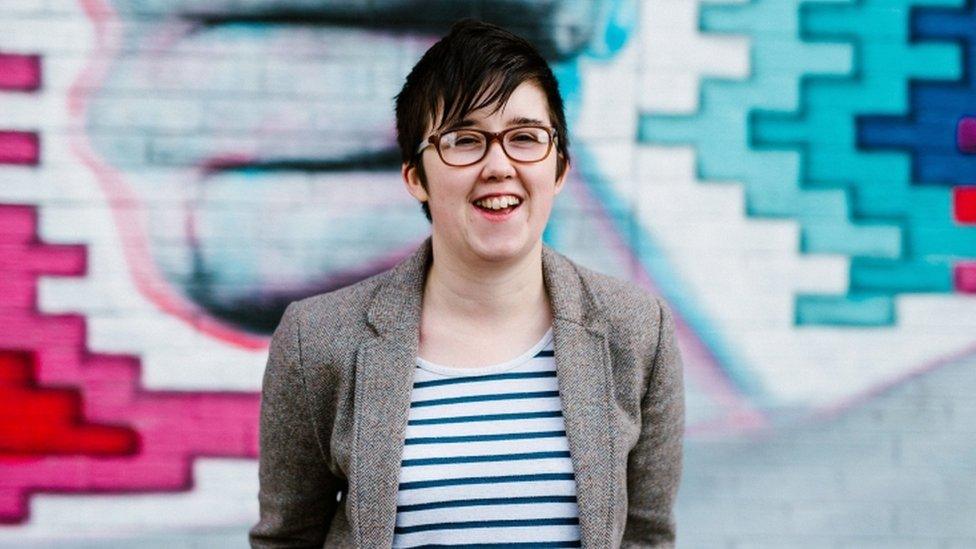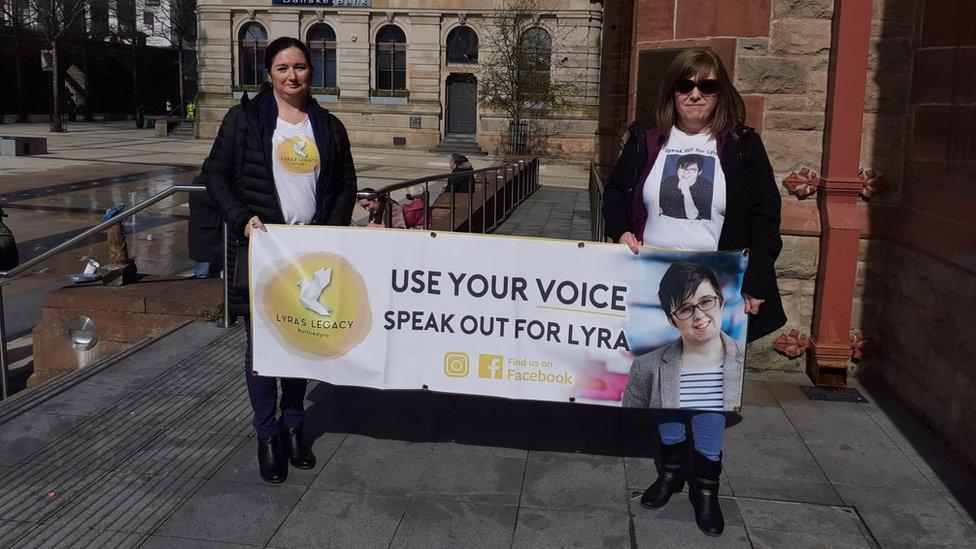Londonderry: Five Terrorism Act arrests at parade
- Published

Some of those involved in the parade wore paramilitary-style clothing
Five men have been arrested under the Terrorism Act following an Easter parade linked to dissident republicans in Londonderry on Monday.
The men are aged 29, 38, 40, 50 and 54.
Police were also attacked with petrol bombs during their operation at the City Cemetery.
The parade had been planned by the National Republican Commemoration Committee, which organises events on behalf of the anti-agreement republican party, Saoradh.
The police have linked the party to the New IRA.
About 1,000 people took part in the demonstration; some of them with their faces covered.
A sixth man, aged 40, was also arrested on suspicion of disorderly behaviour.
Police said they seized a number of vehicles, suspected terrorist uniforms and petrol bombs.
Police were attacked with petrol bombs in Londonderry
The parades commission, which cannot ban marches, imposed a number of conditions on the event, external, including a prohibition on the display of symbols or banners relating to proscribed organisations.
"Earlier today, police were in attendance at a notified parade in the city," Ch Supt Ryan Henderson said on Monday evening.
"On the basis of initial observations, participants in the parade were assessed as having potentially committed criminal offences.
"Police monitored the event closely and, at what was considered to be an appropriate point, took action to secure evidence and make arrests."

Police said no officers were injured when petrol bombs were thrown near the entrance to the City Cemetery
The senior officer said "police officers came under attack from petrol bombs and masonry", however, no officers or members of the public were hurt.
'Desecrate holy ground'
The Bishop of Derry, Donal McKeown, condemned the throwing of petrol bombs from the cemetery grounds.
"Young people need inspiration, not merchants of despair," the Catholic bishop told BBC Radio Foyle.
"Petrol bombs thrown over the cemetery wall desecrate holy ground and threaten the lives of the next generation."
The Police Federation said officers had again faced "the brunt of violence on our streets".
"Disgraceful scenes by those intent on breaking the law and causing mayhem in their own community," the federation added.
Earlier, the partner of journalist Lyra McKee, who was shot dead in the city on 18 April 2019, and whose killing has been blamed on dissident republicans, accused those involved in the parade of having "no respect".
Sara Canning said the organisers had "no sense of understanding, no empathy as to what we're going through".

Lyra McKee was observing rioting in Londonderry's Creggan estate when she was shot in 2019
In its ruling, the parades commission stated objectors had described the parade as "an insult" to Ms McKee's family.
It stated the route had been modified by organisers to avoid the location of the murder and that for "the first time in years" notification of the event had been submitted in compliance with the law.
In setting out a number of conditions, the commission said it recognised "the extreme sensitivity and pain of this day for all Lyra's family and the wider community".
On Monday, two vigils took place in the city to remember Ms McKee on the third anniversary of her death.

A vigil was held in Londonderry's Guildhall Square on Monday
The first, organised by the National Union of Journalists, was held at Derry's Guildhall.
Another vigil, arranged by the journalist's family and friends, took place at midday when flowers where laid at the spot where she was killed.
Allow X content?
This article contains content provided by X. We ask for your permission before anything is loaded, as they may be using cookies and other technologies. You may want to read X’s cookie policy, external and privacy policy, external before accepting. To view this content choose ‘accept and continue’.
Ms McKee's sister, Nichola Corner, told BBC Radio Foyle that her death was like "a nightmare that never ends".
"I feel really sick about today, I feel like she should still be here with us and she isn't.
"I feel like we have been thrown into a nightmare that will never end."
Police have also made a fresh appeal for information about the killing.
Det Supt Eamonn Corrigan said his thoughts were with Ms McKee's "family, partner, friends and colleagues".
"To date, as part of our ongoing investigation, we have made 30 arrests and nine people have been charged, three with murder and six with public order offences," he added.